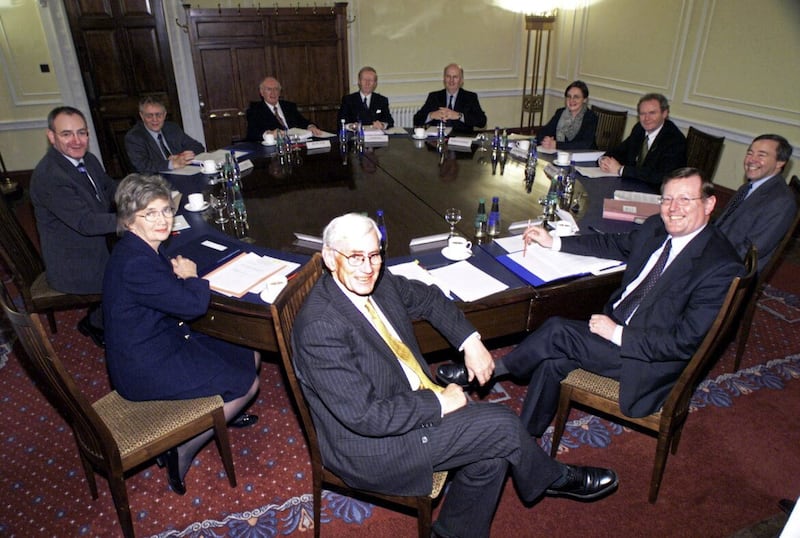On this day, exactly 25 years ago, I was sitting in the public gallery of the Northern Ireland Assembly.
It was coming up to 6pm and Gerry Adams, in his role as nominating officer for Sinn Féin, had just nominated Martin McGuinness to an executive position as minister of education.
The look on the faces of every single unionist in the seats below me was one of what might be described as stunned realisation. The realisation that politics had changed for ever.
Cedric Wilson, a member of Robert McCartney’s UK Unionist Party, rose from his seat: “I cannot sit through this obscenity. I am leaving.” Three members of the DUP also left the chamber.
The UUP’s Danny Kennedy, in an interview afterwards, described it as a “deliberately provocative” appointment, adding that “many parents, teachers and educationalists would be very concerned and alarmed”.
What was perhaps more extraordinary, though, was that Ian Paisley nominated Peter Robinson and Nigel Dodds to the departments of regional development and social development; although it had been made clear that they would not be joining Sinn Féin around the executive table and would, instead, receive executive papers etc elsewhere.
It was the sort of ‘stunt’ expected from the party, but it did enable John Hume to say: “It is a huge and historic development. This is the first time in our history that representatives of all sections of our people will be working together in government. It will transform our society and replace the politics and violence of the past.”
The problem, of course, was that the executive had been established on a lack of clarity.
Two days earlier David Trimble had managed to convince his party’s governing council – although by a much lower than hoped for majority of 58% – to row back from its previous ‘no guns, no government’ policy and agree to establish the executive on a promise to collapse it if the IRA had not moved on decommissioning within three months.

As he noted at the press conference after the meeting: “We have done our bit. Mr Adams, it is over to you. We have jumped, you follow.”
In his book Great Hatred, Little Room, Jonathan Powell - Tony Blair’s chief of staff and chief negotiator – argued that unionists had been unwise to allow Sinn Féin to select both education and health. He was right.
It wasn’t just that McGuinness was in the executive, along with Bairbre de Brún, but that they were controlling almost three-quarters of the entire budget.
In terms of unionist perceptions that made life difficult for Trimble. And his post-dated letter of resignation in February also tied his hands, particularly since he hadn’t nailed down anything resembling a timetable with either Sinn Féin or the British and Irish governments.
I had always had difficulty with the ‘no guns, no government’ strategy. Yes, it got Trimble over one big hurdle, but it was also interpreted by Sinn Féin – and others – as a ‘no government, no guns’ position.
Anyway, the strategy didn’t work on this occasion. The executive was up and down like a yo-yo after power was formally devolved on December 2, before finally collapsing altogether on October 15 2002.
A key lesson the DUP and Sinn Féin learned from Trimble’s experience and headaches during this period was to agree timetables rather than try to ambush each other. For Trimble, constructive ambiguity had finally morphed into destructive clarity.

During the periods when the assembly/executive was functioning, it was a bit like Samuel Johnson’s reference to a dog walking on its hind legs: “It is not done well, but you are surprised to find it done at all.”
I do think that there were moments when the executive ministers did surprise themselves in their ability to govern. None of them had any experience of it; and nor did any of the other MLAs or civil service.
Paul Moore, author of the very insightful book Doctor Paisley and Mister Clerk, also makes a persuasive case for the effectiveness of the new assembly committees in that 1999-2002 period.
- A key lesson the DUP and Sinn Féin learned from Trimble’s experience and headaches during this period was to agree timetables Opens in new window
- The DUP and Sinn Féin are both to blame for killing off power-sharing – Alex KaneOpens in new window
- Alex Kane: The problem with Northern Ireland is that there is no solutionOpens in new window
But none of them knew, or could know, the sheer scale of what they were undertaking, and matters weren’t helped by the fact that the shadow of decommissioning and Trimble’s ongoing civil war with his own party meant that the institutions were, for the most part, wobbly all the way through.
They remain wobbly. Which is a pity, because the challenges since 1999 have multiplied and show no sign of lessening.
Worryingly, I fear that the hope that existed in November 1999 – and in April 1998 and May 2007 – has almost vanished.
Hope and stability should go hand-in-hand in the journey from conflict to reconciliation, yet they still seem to be on opposite sides of the road, walking in different directions.
Hope and stability should go hand-in-hand in the journey from conflict to reconciliation, yet they still seem to be on opposite sides of the road, walking in different directions



